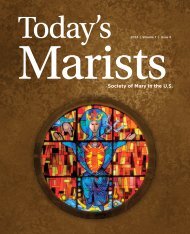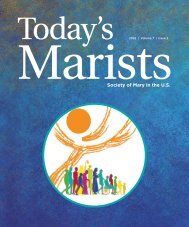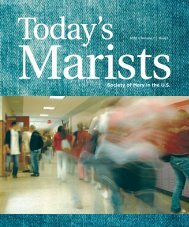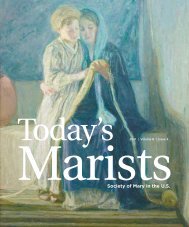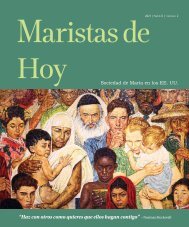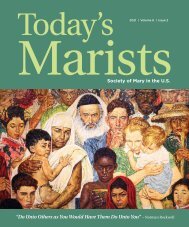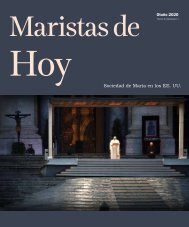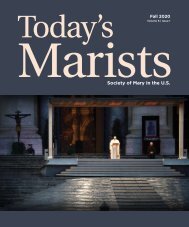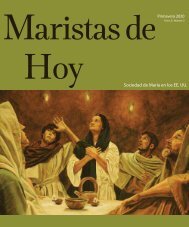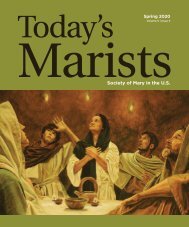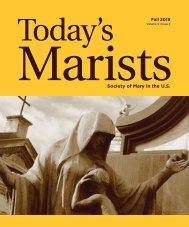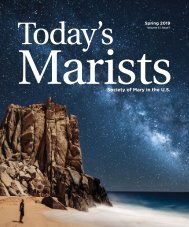Today's Marists 2024 Volume 8, Issue 2
Create successful ePaper yourself
Turn your PDF publications into a flip-book with our unique Google optimized e-Paper software.
BUILDING BRIDGES:<br />
The Power & Promise of<br />
Interfaith Dialogue<br />
by Brendan Murphy, Social Studies Teacher, Marist School, Atlanta, Georgia<br />
Pope John Paul II’s historic trip to Israel in<br />
March 2000 marked a significant milestone<br />
in interfaith relations and global diplomacy.<br />
This pilgrimage, spanning from March 21st<br />
- 26th, was the first-ever visit by a reigning<br />
pontiff to the Holy Land, carrying profound<br />
symbolic and spiritual weight.<br />
The journey was deeply rooted in Pope John<br />
Paul II’s commitment to fostering dialogue<br />
and reconciliation between Catholics and<br />
Jews, as well as among various religious<br />
communities. His itinerary included visits<br />
to key religious sites sacred to Christianity,<br />
Judaism and Islam, emphasizing the shared<br />
heritage and interconnectedness of these<br />
faith traditions.<br />
One of the most poignant moments of the<br />
trip was the Pope’s visit to the Western<br />
Wall, the holiest site in Judaism, where he<br />
prayed for forgiveness for historical wrongs<br />
committed against Jews by Christians.<br />
This act of contrition and reconciliation<br />
resonated deeply with both Jewish and<br />
Christian communities worldwide,<br />
symbolizing a profound step towards healing<br />
centuries-old wounds.<br />
Additionally, Pope John Paul II’s visit to Yad<br />
Vashem, Israel’s Holocaust memorial, further<br />
underscored his commitment to combating<br />
antisemitism and promoting tolerance and<br />
understanding. His impassioned plea for<br />
remembrance and vigilance against hatred<br />
served as a powerful call to action in the face<br />
of ongoing prejudice and discrimination.<br />
The Pope’s pilgrimage also had significant<br />
political implications, as he met with Israeli<br />
leaders, including President Ezer Weizman<br />
and Prime Minister Ehud Barak, as well as<br />
Palestinian Authority President Yasser Arafat.<br />
These diplomatic engagements underscored<br />
the Vatican’s support for the Israeli-<br />
Palestinian peace process and highlighted<br />
the Pope’s role as a global statesman<br />
advocating for peace and justice.<br />
Overall, Pope John Paul II’s historic journey<br />
to Israel transcended religious, political and<br />
cultural boundaries, leaving an indelible<br />
mark on the collective consciousness of<br />
humanity. His message of reconciliation,<br />
peace and solidarity serves as a beacon of<br />
hope in today’s often tumultuous world.<br />
In an increasingly interconnected world<br />
where diversity is celebrated yet often<br />
a source of tension, the importance of<br />
dialogue between the Abrahamic faiths –<br />
Judaism, Christianity and Islam – cannot<br />
be overstated. While each tradition has its<br />
distinct beliefs and practices, they share a<br />
common heritage rooted in monotheism<br />
and a reverence for Abraham as a patriarch.<br />
Dialogue among these faith communities is<br />
essential for fostering mutual understanding,<br />
promoting peace and addressing common<br />
challenges in today’s global society.<br />
First and foremost, interfaith dialogue<br />
helps to dispel misconceptions and<br />
stereotypes that can lead to prejudice<br />
and discrimination. In an era where<br />
misinformation spreads rapidly through<br />
various media channels, meaningful<br />
conversations between adherents of different<br />
faiths offer an opportunity to challenge<br />
10 Today’s <strong>Marists</strong> Magazine




